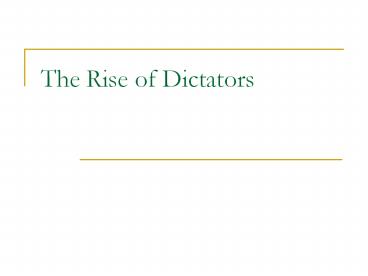The Rise of Dictators - PowerPoint PPT Presentation
1 / 9
Title:
The Rise of Dictators
Description:
The Rise of Dictators Totalitarian State Exercises total control over the people Dominates government State controls Business Family life Labor Youth groups Religion ... – PowerPoint PPT presentation
Number of Views:131
Avg rating:3.0/5.0
Title: The Rise of Dictators
1
The Rise of Dictators
2
- Totalitarian State
- Exercises total control over the people
- Dominates government
- State controls
- Business
- Family life
- Labor
- Youth groups
- Religion
- Education
- The arts
- Housing
- Demands total obedience to authority and personal
sacrifice to the state - Use force, such as police terror, to crush all
opponents - Totalitarian leaders
- centralize the government
- control every aspect of public and private life
- appear to provide a sense of direction
- limit values such as freedom, dignity and
individual worth.
3
- Hitler
- Hitlers rule
- He was a dictator, created the Third Reich in
Germany - Gained control with a slim majority.
- Used propaganda and brute force to glorify
himself and War. - He moved his armies into countries like Austria
and Czechoslovakia - Eventually his aggressive behavior started the
bloody WWII. - It becomes a fight between the Allied and the
Axis powers - Millions died in the war
- Holocaust
- He had hatred for Jews, Anti-Semitism, and
started persecuting them. - Laws prevented Jewish rights, and on
Kristallnacht many were persecuted - The Final solution began to exterminate Jews by
the millions in concentration camps. - About 6 million were murdered
4
- Weimar Republic
- Germanys Democratic government set up in 1919.
(named after the birth place of National
Assembly) - At the time, the Weimar Republic was weak because
of Germanys lack of democratic tradition. - The economy was very weak.
- The people blamed the democratic government for
both the depressions in Germany and for signing
the Treaty of Versailles. - The Weimar Republic became and easy target for
the Nazi Party to rise up against.
5
- Fascism
- Fascism emphasized loyalty to the state and
obedience to the leader. - Fascists promised many things and gained favor of
the peasants. - Fascism is based mostly on nationalism, or
loyalty to ones country. - Also believed in a strong military
- Fascists used propaganda and wore certain colored
uniforms to display their authority. - Fascism like communism, the country was ruled by
a dictator who used fear and terror. - Stared in Italy in the later 1920s.
- Fascists believed that each class had a certain
place and function unlike communism.
6
- Mussolini
- He was a newspaper editor and politician who
promised to rescue Italy by reviving its economy
and rebuilding its armed forces. - He vowed to give Italy strong leadership.
- He founded the Fascist party in 1919.
- He failed to gain widespread popularity at first,
but as the economy worsened his popularity
rapidly increased. - Mussolini publicly criticized Italys government
and a group of Fascists attacked communist and
socialists. - Because Mussolini played on the fear of a workers
revolt he began to win support of the middle
class, the aristocracy, and the industrial
leaders. - Thus after widespread violence and a threat of
armed revolt Mussolini legally took power. - When in power he abolished democracy and all the
other political parties besides Fascism. - He put censors on the press, so they could only
report Fascist doctrines. - His country became the model for other fascist
governments.
7
- Italy Invades Ethiopia
- 1935- Italian army invaded African country of
Ethiopia - Ethiopians resisted, but the Italians had armored
vehicles, aircraft, and poison gas (much better
weapons then Ethiopian weapons). - The Ethiopian king appealed to the League of
Nations - The League of Nations agreed to stop the sale of
weapons and other war materials to Italy. - The agreement was not honored by all nations.
- Ethiopia fell to Italy and the League of Nations
showed it was powerless to stop the rise of
dictators.
8
- Japan-Militarism and Expansion
- Why Japan expanded
- Japan was an modernized country that needed
resources they lacked like oil, steel, and coal. - Japan decided to go out into other countries and
get those recourses - When Japan expanded
- Japans expansion started 1931
- What came from Japans expansion
- Japan with its expansion they wanted as much land
as possible - Japan attacked Pearl Harbor Dec 7th, 1941
- This lead to World War II
9
- Japan Invades China
- In 1931, Japan watched Chinas Communist vs.
Nationalist civil war with interest - Took advantage of the countrys weak situation
and invaded Manchuria-start of WWII in Asia - In 1937, Japan launched an all-out invasion of
China - Massive destruction of villages and farms,
starvation was rampant in China - Communists and Nationalists temporarily formed a
truce to fight off the Japanese - The invasion of China by Japan caused strained
relations between Japan and the U.S. and the U.S.
cut off its oil supply to Japan - This would lead to Japanese aggression towards
the U.S. and the bombing of Pearl Harbor.































